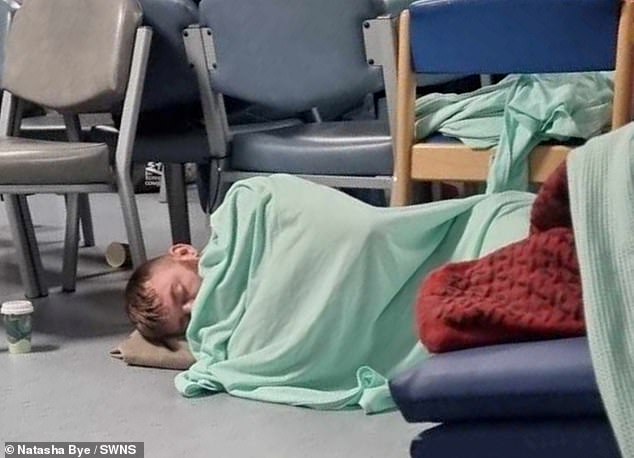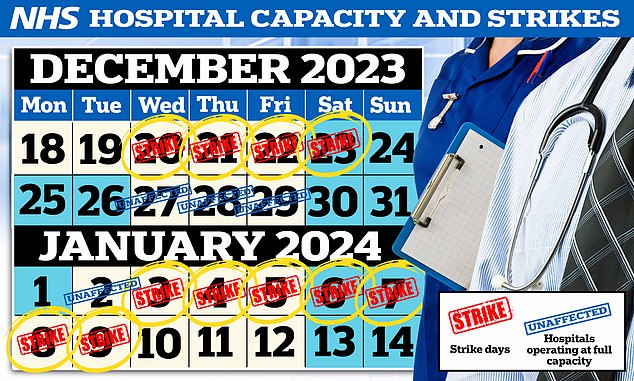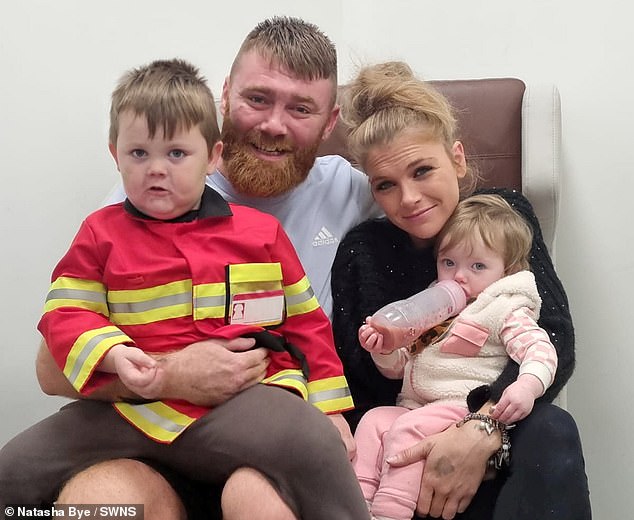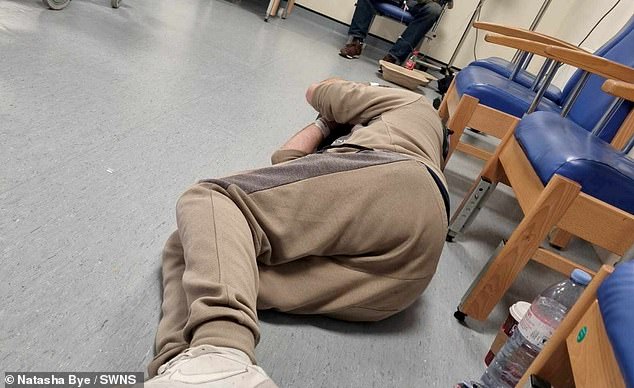NHS strike chaos begins as A&E unit CLOSES ahead of devastating three-day walk-out as injured A&E patient is made to lie on hospital floor during horrifying 45-HOUR wait for bed
The NHS strike chaos has already led to the closure of an emergency department over the festive period.
The Cheltenham General Hospital ward will be closed this morning until 8am on December 23 – shortly after the national three-day junior doctors' strike ended.
It will close again from 8pm on January 1 to 8am on January 9, to cover the next wave of action from the British Medical Association (BMA), which will be the biggest ever to rock the NHS.
Patients in life-threatening conditions are taken to Gloucestershire Royal Hospital in 30 minutes for emergency care.
Health chiefs have already warned that the coming move threatens 'massive disruption' to 'almost all' routine care.
It comes during what is typically the busiest time of year for hospitals, which are already juggling record backlogs.
In a sign of the intense pressure facing the NHS before the carnage of the strike begins, an A&E patient in Kent had to wait 45 hours before a ward bed became available.
The Cheltenham General Hospital ward will be closed this morning until 8am on December 23 – shortly after the national three-day junior doctors' strike ended

Steven Wells (pictured sleeping on the floor at William Harvey Hospital in Ashford, Kent) had to wait 45 hours in A&E after he started vomiting blood and was forced to sleep on the floor while he waited to be admitted

NHS bosses had already warned that hospitals will only operate at full capacity for four weekdays until January 10. Only December 27, 28, 29 and January 2 are not affected by the impending chaos of the holidays and strikes until January 10.
Steven Wells, a 31-year-old forklift driver, vomited blood when he arrived at William Harvey Hospital in Ashford, Kent, at 1am on November 13.
But he was not given a bed in a ward until November 14 at 10 p.m.
Sharing a photo of himself sleeping on the floor, Mr Wells said: 'It really looked like a war zone at times. It makes me not want to go back to the hospital because the last time was so traumatic and embarrassing.
“You have people looking down on you, stepping all over you, and all you want is to just be taken care of.”
He added: “They need more full-time decent staff. There is no excuse for the way I was treated.
'If you're in so much pain and discomfort, they have to find a bed for you anywhere.
Gloucestershire Hospitals NHS Trust said the closure was 'not taken lightly' and that it would work closely with local partners to ensure people in 'the greatest need continue to have access to high-quality care and support'.
During both In the event of disruption, ward services for minor injuries and illnesses will not be provided at Cheltenham General Hospital. It will be closed all night.
Dr. Ananthakrishnan Raghuram, chief medical officer at NHS Gloucestershire, said: 'WWe regret that many patients will experience disruption to services.”
Patients requiring planned surgery or procedures in hospital during the strike period should attend as usual unless told otherwise.
Thousands of trainee doctors will leave their posts for three days before Christmas, from December 20.
A further six days of action are planned from January 2 – the longest in the 75-year history of healthcare.
Staff are expected to work on a 'Christmas Day' basis during both periods of industrial action, meaning emergency support must continue to be provided.
Ministers and representatives of the BMA had been locked in negotiations for five weeks in an attempt to find a solution to the long-running pay dispute.
But the union said its junior doctors committee voted unanimously in favor of further strikes after accusing the Department of Health and Social Care of failing to make a “credible” offer.
They said the Government's three per cent increase, on top of the average 8.8 per cent increase they received in the summer, was 'completely insufficient'.
Junior doctors start at £30,000 but can earn up to £60,000 before progressing.
Labour's shadow health and social secretary, Wes Streeting, said: 'The prospect of emergency departments closing thanks to Rishi Sunak's failure to end the NHS strikes will send shivers down patients' spines.

Mr Wells (pictured with his partner and two children), a 31-year-old forklift driver, arrived at William Harvey Hospital at 1am on November 13. But he was not given a bed in the ward until November 14 at 10 p.m.

Mr Wells (pictured sleeping on the floor at William Harvey Hospital) said: 'It really looked like a war zone at times. It makes me not want to go back to the hospital because the last time was so traumatic and embarrassing. “You have people looking down on you, stepping all over you, and all you want is to just be taken care of.”
'The Conservatives must now stop playing politics with our NHS, sit down with young doctors and negotiate an end to these strikes.'
NHS bosses had already warned that hospitals will only operate at full capacity for four weekdays until January 10.
Only December 27, 28, 29 and January 2 are not affected by the impending chaos of the holidays and strikes until January 10.
Professor Sir Stephen Powis, national medical director of the NHS, said: 'If you include the Christmas and New Year holidays, these strikes will extend that period of reduced activity and also put the health service on the back foot into the new year, which is a time where we see demand increasing significantly.'
The NHS has now had a full calendar year of strikes, the first of which took place on December 15, 2022.
Since then, more than 1.1 million inpatient and outpatient appointments have been rescheduled.
But the co-chairs of the BMA's junior doctors committee, Dr Rob Laurenson and Dr Vivek Trivedi, also warned today that the government 'can still avoid the need for these strikes'.
They added: “We will be ready whenever they want to talk.” If a credible offer can be made the day before or even during an action, these strikes can be canceled.
'Every winter we sound the alarm about the NHS and every winter the government fails to make the necessary investment in staff to prevent the crisis – now is the time to break the trend.'
The latest NHS figures show that in November almost 43,000 emergency department visitors across England had to wait more than 12 hours before being admitted, transferred or discharged.
Only seven in 10 were seen within four hours – the goal of healthcare.
But these figures only look at the wait for the trolley: the time between doctors deciding that a patient needs to be admitted and the moment they get a bed.
Figures on the exact arrival times at the emergency department paint a much bleaker picture: one in ten people has to wait at least twelve hours.
Dr. Vicky Price, president-elect of the Society for Acute Medicine, said: 'We have been warning about the dangers of ward care for almost all year, and the fact that this has gone on for so long reflects that it is now seen as routine practice. – but it is unacceptable.
'It's not safe, especially for older patients. It is humiliating and demoralizing for the staff.”
